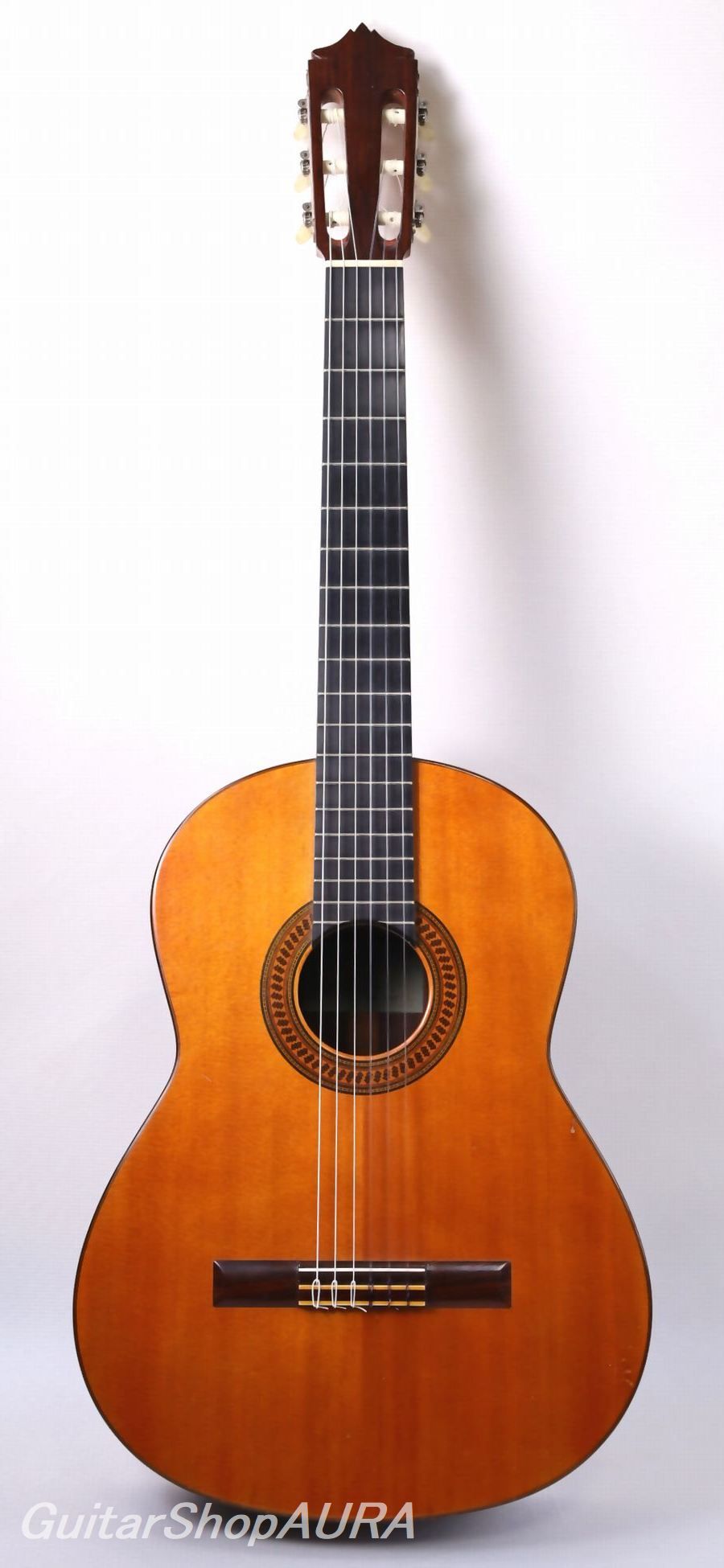
| Instrument | Masaji Nobe |
| Category | Japanese Classical Guitars 〔Vintage〕 |
| Number/Model | |
| Scale length | 660mm |
| Country | Japan |
| Year | 1968Year |
| Top | Solid Spruce |
| Side&Back | Solid Indian Rosewood |
| Condition※ | 7 |
| List price | INQUIRE |
| Price (tax included) | Please Inquire |
| option | With Hardcase |
Click to enlarge the photos below
Neck: Mahogany
Fingerboard: Ebony
Finish(Top): Lacquer
Finish(Back & Sides): Lacquer
Tuning Machines: Unknown
String Height(1st): 4.0mm
String Height(6th): 5.0mm
[Luthier Information]
Masaji Nobe (1935–2004) was a distinguished Japanese luthier whose work reflected the heritage of Edo-era sashimono woodworking, a highly refined carpentry tradition characterized by precision joinery and fine aesthetic sense. His father, Ikuei Nobe, originally a traditional joiner in Tokyo, began repairing guitars using his woodworking skills, which laid the foundation for the Nobe family guitar workshop.
In 1965, Masaji Nobe established his own workshop. Drawing from his background, he was known for:
Careful wood selection
Superb craftsmanship
Unique and tasteful design sensibilities
His instruments possess a mature, subdued beauty—both visually and tonally. While grounded in the Spanish classical guitar tradition, they avoid overt flamboyance, offering instead a refined, mellow sound reminiscent of aged silver—quietly powerful, deeply expressive, and unlike any other.
His older brother, Kuniharu Nobe, also made guitars. After Masaji Nobe’s passing in 2004, the workshop and remaining tools/materials were inherited by his son Masashi Nobe, who continues the family tradition. Another son, Seiichi Nobe, has also established an independent workshop, where he not only crafts guitars but also restores early plucked string instruments and sells antique furniture.
[Instrument Information]
Masaji Nobe – 1968 – Classical Guitar – Used
This is a rare and charming example of Masaji Nobe’s craftsmanship from 1968, offering a quietly dignified aesthetic that reflects the refined tradition of Edo-era furniture making. The visual character of the guitar suggests an antique piece of fine cabinetry—subtle, balanced, and rich in depth.
Tonally, the guitar is equally distinctive:
Full-bodied yet mellow tone with an understated strength
Spruce top offers clarity and warmth
658mm scale length adds a touch of string tension, contributing to its strong but unforced projection and focused articulation
[Bracing & Internal Construction]
This guitar features a thoughtfully designed internal structure that blends influences from both Spanish and French traditions:
Two harmonic bars (above and below the soundhole)
A diagonal treble bar extending from the center of the lower harmonic bar toward the treble side
Seven fan braces fanning out toward the lower bout, passing through a wide transverse bar placed beneath the bridge area
Additional features:
Thin reinforcement plates placed symmetrically between the soundhole and neck block area on both sides
The transverse bar, while rectangular and even in height, is reminiscent of Robert Bouchet’s bracing pattern
The use of a treble bar also suggests inspiration from Spanish makers such as Aguado
The main resonance is set just below G#, adding to the guitar’s mature tonal quality with a well-controlled low end and a focused, lyrical high register.
[Condition]
This guitar is in very good structural condition, with no cracks or significant repairs.
Top:
Two visible scratches (5–8 cm) on the bass side of the soundhole (not deep)
Several dings and marks around the waist, lower bout edges, and below the bridge
Back: Light surface scratches and rubbing marks from clothing, but overall clean
Sides: Numerous shallow scratches, especially on the lower bout area; some visible finish transition at the side seam and neck heel, but no structural issues
Neck: Excellent condition with very minimal wear
Playability: Very good—neck and frets in healthy condition
Setup & Hardware
String action at 12th fret:
1st string: 2.8mm
6th string: 3.9mm
Saddle height remaining: 1.0–1.5mm
Tuners: Original Höfner tuners (40mm spacing), functioning well; slight knob deformation on 4th string tuner but does not affect performance
Summary
A beautifully hand-crafted instrument by Masaji Nobe, offering:
Rare Japanese craftsmanship from the 1960s
Sophisticated tone—mature, warm, and introspective
A wonderful blend of Spanish, French, and Japanese lutherie traditions
Collectible value and distinctive voice for players seeking an instrument with character and soul